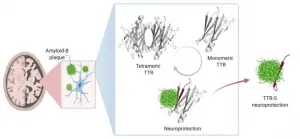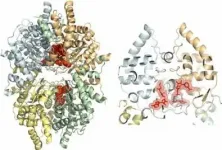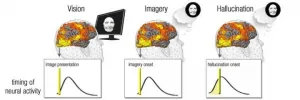Perception of palliative care in South Asian populations
Work needed to make palliative care more accessible
2021-01-07
(Press-News.org) January 7, 2021 (BRAMPTON - HAMILTON) -- When dealing with a life-limiting illness, palliative care can improve the quality of life for patients and families. However, for many people, the fear of "end of life" care prevents them from exploring it. A recent study from William Osler Health System (Osler) and McMaster University examined awareness of palliative care in the South Asian community and found that culture plays a critical role in the perception of palliative care. This perception, in turn, affects whether or not patients will be open to receiving it.
Funded by a McMaster University, Department of Family Medicine, Pilot Research Project Funding Grant, the observational study is one of the few person-centered palliative care studies focused on the South Asian community outside India. The results showed that seventy per cent of participants in the study had a lack of understanding of palliative care and forty-four per cent thought that palliative care went against their values and beliefs.
At the same time, many of the participants agreed that when facing a life-limiting illness, they wanted to ensure that they or their family members had a better quality of life and alleviated suffering - which is what the palliative care paradigm provides.
"This research is an essential first step in understanding how the South Asian community perceives what it's like to deal with a serious illness and their fears about palliative care," said Dr. Naheed Dosani, Palliative Care physician, William Osler Health System. "Too often in health care a one size fits all approach is used in communities with diverse populations. This study illustrates how creating customized approaches focusing on the needs of the local community will allow us to provide more effective palliative care."
Recent Ontario research also indicates that immigrants of South Asian origin are at a higher risk of aggressive end-of-life care that is often contrary to their wishes. There is a strong likelihood that perceptions of palliative care within the South Asian populations are contributing to this.
"Being aware of cultural differences is an important part of working with patients," said Dr. Martin Chasen, Medical Director of Supportive and Palliative Care, William Osler Health System. "This study is a key part of Osler's mandate to strengthen our expertise in treating diverse populations and to ensure all our patients have access to safe, compassionate, quality care."
Other key findings in the study showed that participants had differing attitudes when it came to talking about death - ranging from discomfort to frank acceptance. Participants also acknowledged the key role of the family in providing care. While the study showed education is necessary to change common perceptions of palliative care, cultural values, faith, and spiritual beliefs didn't necessarily pose a barrier to participants accepting palliative care services.
"Insights from this study will have implications on the development and implementation of culturally competent palliative care services for health care professionals," said Dr. David Price, Chair and Professor, McMaster University Department of Family Medicine. "The term 'palliative care' can mean so many things and this research illustrates the importance of taking into account cultural differences when recommending care in diverse populations."
The study was conducted out of Brampton Civic Hospital, where the surrounding community per capita population of South Asian immigrants and peoples of descent is seventy per cent.
"I always thought palliative care was focused on end-of-life care," said Tejinder Cheema, the daughter of an Osler palliative care patient. "However, after speaking with the team at Brampton Civic and learning that palliative care is focused on managing symptoms and improving quality of life, I was happy to include it in my mother's treatment plan."
INFORMATION:
Published in the BMC Palliative Care journal in September 2020, Perceptions of palliative care in a South Asian community: findings from an observational study, the study explores how differing cultural and social norms and religious affiliations impact perceptions of palliative care within the South Asian community.
ABOUT WILLIAM OSLER HEALTH SYSTEM and FOUNDATION: William Osler Health System is a hospital system, which includes Brampton Civic Hospital, Peel Memorial Centre for Integrated Health and Wellness and Etobicoke General Hospital, and serves 1.3 million residents of Brampton, Etobicoke and surrounding communities within the Central West region. Osler's emergency departments are among the busiest in Canada and its Mental Health and Addictions program is one of the largest in Ontario. William Osler Health System Foundation seeks to create a healthier community through giving by inspiring its communities to invest in exceptional health care close to home.
ABOUT MCMASTER UNIVERSITY: McMaster University, one of four Canadian universities listed among the Top 100 universities in the world, is renowned for its innovation in both learning and discovery. It has a student population of 23,000, and more than 160,000 alumni in 140 countries. The Michael G. DeGroote School of Medicine has a global reputation for educational advancement, and is internationally known for its research intensity and development of evidence-based medicine.
For more information:
Donna Harris
Manager, Public Relations and Digital Media
William Osler Health System
P: 416-543-9294
donna.harris@williamoslerhs.ca
Veronica McGuire
Media Relations, Faculty of Health Sciences
McMaster University
P: 905-525-9140 ext. 22169
vmcquir@mcmaster.ca
ELSE PRESS RELEASES FROM THIS DATE:
2021-01-07
TORONTO, January 7, 2021- What feels like up may actually be some other direction depending on how our brains process our orientation, according to psychology researchers at York University's Faculty of Health.
In a new study published in PLoS One, researchers at York University's Centre for Vision Research found that an individual's interpretation of the direction of gravity can be altered by how their brain responds to visual information. Laurence Harris, a professor in the Department of Psychology in the Faculty of Health and Meaghan McManus, a graduate student in his lab, found, using virtual reality, that people differ ...
2021-01-07
DALLAS - Jan. 7, 2020 - A protein that wreaks havoc in the nerves and heart when it clumps together can prevent the formation of toxic protein clumps associated with Alzheimer's disease, a new study led by a UT Southwestern researcher shows. The findings, published recently in the Journal of Biological Chemistry, could lead to new treatments for this brain-ravaging condition, which currently has no truly effective therapies and no cure.
Researchers have long known that sticky plaques of a protein known as amyloid beta are a hallmark of Alzheimer's and are toxic to brain cells. As early as the mid-1990s, other proteins were discovered in these plaques as well.
One of these, a protein known as transthyretin (TTR), ...
2021-01-07
Brazilian researchers have managed to decipher the structure of a protein found in parasites that cause neglected tropical diseases, paving the way to the development of novel medications. Thanks to the discovery it will be possible to seek more potent molecules capable of destroying the pathogens directly, with fewer adverse side-effects for patients.
The study detailed the structural characteristics of the protein deoxyhypusine synthase (DHS), found in Brugia malayi, one of the mosquito-borne parasites that cause elephantiasis, and in Leishmania major, the protozoan that causes cutaneous leishmaniasis.
Elephantiasis, also known as lymphatic filariasis, is an infection of the lymph system that can lead to swelling of the legs, arms, and genitalia. It may also harden and ...
2021-01-07
HOUSTON - (Jan. 7, 2021) - Proteogenomic analysis may offer new insight into matching cancer patients with an effective therapy for their particular cancer. A new study identifies three molecular subtypes in head and neck squamous cell carcinoma (HNSCC) that could be used to better determine appropriate treatment. The research led by Baylor College of Medicine, Johns Hopkins University and the National Cancer Institute's Clinical Proteomic Tumor Analysis Consortium (CPTAC) is published in the journal Cancer Cell.
Researchers profiled proteins, phosphosites and signaling ...
2021-01-07
TROY, N.Y. -- In a money-saving revelation for organizations inclined to invest in specialized information technology to support the process of idea generation, new research suggests that even non-specialized, everyday organizational IT can encourage employees' creativity.
Recently published in the journal Information and Organization, these findings from Dorit Nevo, an associate professor in the Lally School of Management at Rensselaer Polytechnic Institute, show standard IT can be used for innovation. Furthermore, this is much more likely to happen when the technology is in the hands of employees who are motivated to master technology, understand their role in the organization, ...
2021-01-07
In a study to examine a Mediterranean diet in relation to prostate cancer progression in men on active surveillance, researchers from The University of Texas MD Anderson Cancer Center found that men with localized prostate cancer who reported a baseline dietary pattern that more closely follows the key principles of a Mediterranean-style diet fared better over the course of their disease.
"Men with prostate cancer are motivated to find a way to impact the advancement of their disease and improve their quality of life," said Justin Gregg, M.D., assistant professor of Urology and lead author of the study, published today in Cancer. ...
2021-01-07
Tsukuba, Japan - Does losing weight while you sleep sound too good to be true? According to a study by the University of Tsukuba, it seems that drinking oolong tea might help you do just that.
While all tea comes from the same plant, Camellia sinensis, the degree of oxidation, a chemical reaction that turns tea leaves black, defines its specific type. For example, green tea is unoxidized and mild in flavor, while the distinctive color of black tea comes from complete oxidation. Oolong tea, being only partially oxidized, lies somewhere in between and displays characteristics ...
2021-01-07
Some people have lost their eyesight, but they continue to "see." This phenomenon, a kind of vivid visual hallucination, is named after the Swiss doctor, Charles Bonnet, who described in 1769 how his completely blind grandfather experienced vivid, detailed visions of people, animals and objects. Charles Bonnet syndrome, which appears in those who have lost their eyesight, was investigated in a study led by scientists at the Weizmann Institute of Science. The findings, published today in Brain, suggest a mechanism by which normal, spontaneous activity in the visual centers of the brain can trigger visual hallucinations in the blind.
Prof. Rafi Malach and his group members of the Institute's Neurobiology Department research the phenomenon of spontaneous "resting-state" ...
2021-01-07
Research from life-saving charity Air Ambulance Kent Surrey Sussex (KSS) in partnership with the University of Surrey has shown the benefits of dispatching HEMS to patients with a sudden, unexplained LOC of medical origin and a high prevalence of acute neurological pathology.
The study - which is believed to be the first published about HEMS dispatch to non-trauma (neuro) cases - also highlights how HEMS dispatchers in dialogue with ambulance personnel are able to select patients requiring HEMS-specific interventions and, based on its findings, identifies opportunities to improve triage for these patients.
Through a retrospective study of all patients with a LOC ...
2021-01-07
In a study spanning four decades, researchers from the University of Hong Kong's Research Division for Ecology & Biodiversity (HKU) in the Faculty of Science, and Toho University's Department of Biology (Toho), Japan, have discovered that predation by snakes is pushing lizards to be active at warmer body temperatures on islands where snakes are present, in comparison to islands free from snakes. Their work also detected significant climatic warming throughout the years and found lizard body temperatures to have also increased accordingly. The findings show that lizard thermal biology is highly dependent on predation pressures ...
LAST 30 PRESS RELEASES:
[Press-News.org] Perception of palliative care in South Asian populations
Work needed to make palliative care more accessible



